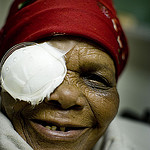A large-scale survey of South African healthcare workers has revealed major gaps in workplace protection against tuberculosis, HIV and hepatitis, according to a University of British Columbia health researcher.
Presenting findings today at the 2014 annual meeting of the American Association for the Advancement of Science (AAAS), Dr. Annalee Yassi says issues such as confidentiality, stigma, technological capacity and staff training need to be addressed while improving hospital resources and protocols.

Hospital workers in South Africa deal with greater health risks — and more patients. Photo: Creative Commons.
Preliminary results of the 2012 baseline survey of more than 1,000 healthcare workers in three hospitals show that more than 68 per cent of patient care staff had never been screened for TB; nearly 20 per cent were not vaccinated against hepatitis; and 55 per cent did not wear respiratory protection when needed. Despite South Africa’s high TB and HIV rates – 18 per cent of its adult population is HIV-positive – and risk of hepatitis transmission, recapping of used needles before disposal and washing and reusing of gloves were common, with more than 20 per cent surveyed reporting needlestick injury or unprotected exposure to bodily fluids.
Yassi, who is helping South Africa implement occupational health guidelines developed by the World Health Organization (WHO), says healthcare workers in developing countries face greater health challenges while serving significantly more patients.
“In addition to massive workloads, healthcare workers in developing countries are more likely to get sick from the workplace,” says Yassi, a professor in UBC’s School of Population and Public Health, noting that healthcare workers in South Africa are at three times the risk of contracting TB than other South Africans, and more than seven times more likely to be hospitalized for drug-resistant TB. A 2013 WHO estimate showed South Africans were almost 300 times more likely to contract TB than Americans.
“Considerable progress is being made, including better standard operating procedures and screening,” says Yassi. “But there’s much more we can do to ensure a healthy workplace for the international health care workforce.”
Dr. Annalee Yassi’s AAAS presentation, Promoting Health Equity by Addressing the Needs of International Health Workers, is at 10-11:30am, Feb. 14, 2014.